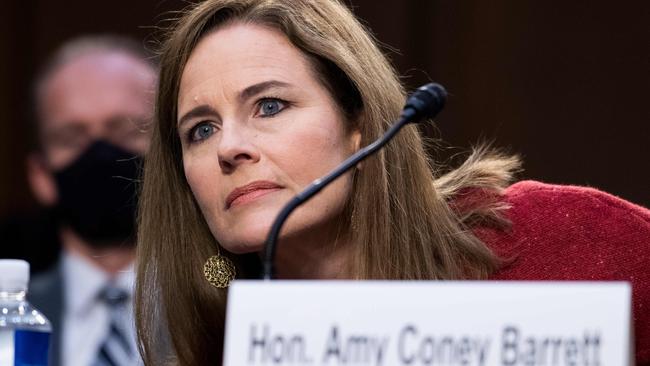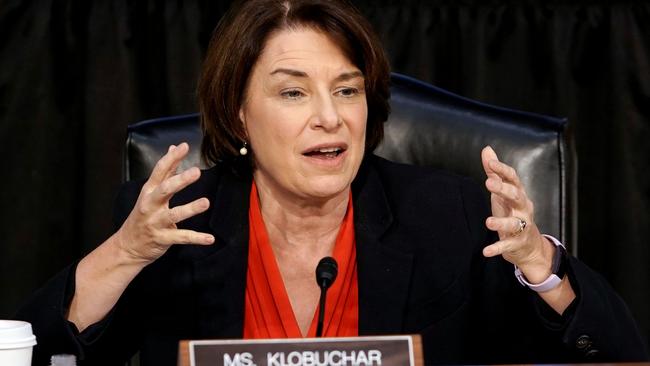‘You make the policy … I follow the law’: Amy Coney Barrett US Supreme Court confirmation hearing
Nominee Amy Coney Barrett declares during confirmation hearing that she is ‘not hostile’ towards Obamacare.

Supreme Court nominee Judge Amy Coney Barrett has declared she is “not hostile” towards Obamacare but has declined to say whether she would oppose the landmark Roe v Wade abortion law during her confirmation hearing.
Under sustained questioning from Democrat senators, the 48-year-old judge appeared calm, composed and methodical, saying she would be an apolitical justice who would determine cases on the basis of the law, not personal belief.
Day two of the four-day hearing saw Ms Barrett, who is a conservative and a practising Catholic, peppered with questions about her attitude to health care, abortion, guns and gay rights, among other issues.
Ms Barrett batted away the questions on the court’s previous rulings including Roe v Wade, saying it would be wrong for a Judge to “grade” court decisions or “give a thumbs up or thumbs down”.
“Judges can’t just wake up one day and say, ‘I have an agenda. I like guns. I hate guns. I like abortion. I hate abortion’, and walk in like a royal queen and impose their will on the world,” she said.
“It’s not the law of Amy. It’s the law of the American people.”
The pro-life judge evaded direct questions from Democrat Dianne Feinstein about whether she opposed Roe v Wade, saying only that she had “no agenda” in relation to it.

Senator Feinstein said that Ms Barrett’s refusal to state a clear position on the issue “makes it difficult for me and other women on this committee because this is a very important case and it affects millions of women. You could be a very important vote”.
In response, Ms Barrett said: “Senator, I completely understand why you are asking the question, but again, I can’t pre-commit or say ‘yes, I’m going in with some agenda’.
“I have no agenda to try to overrule Casey,” the judge said in reference to the subsequent court decision affirming the constitutional right in Roe v Wade “I have an agenda to decide cases as they come.
“I can’t express views on cases and pre-commit to approaching a case in any particular way … I will follow the law.”
Ms Barrett defended her reluctance to state a position on such issues by referring to the stance taken by the late Justice Ruth Bader Ginsburg during her confirmation hearing.

“Justice Ginsburg with her characteristic pithiness used this to describe how a nominee should comport herself at a hearing: no hints, no previews, no forecasts. That has been the practice of nominees before her, but everybody calls it the ‘Ginsburg Rule’ because she stated it so concisely and it’s been the practice of every nominee since,” Ms Barrett said.
Using the same rule, she also declined to say whether she would support any move to strike down the Affordable Care Act when it comes before the court in November.
But while she did not say how she might vote on the ACA, she added that “I am not hostile to the ACA. I apply the law, I follow the law. You make the policy.”
Ms Barrett also declined to say whether she would recuse herself from either the ACA case or any election-related cases that might reach the court after the poll.
She said that no-one in the White House had sought any commitment from her as to how she might vote on any issue.
Although the Democrats were direct in their questioning of Ms Barrett, there was little of the personal rancour that marred the hearings for Brett Kavanaugh in 2018.
Even so, Democratic Senator Amy Klobuchar said Ms Barrett’s views would lead to judgments which would have “severe repercussions” for the American people.
“I believe, and I think the American people have to understand, that you would be the polar opposite of Justice Ginsburg,” Senator Klobuchar said.

Ms Barrett gave an impassioned defence of her ability to separate her personal views from her legal judgments.
“Look, I’ve made distinct choices. I’ve decided to pursue a career and have a large family. I have a multiracial family. Our faith is important to us. All of those things are true. But they are my choices. And in my personal interactions with people, I have a life brimming with people who’ve made different choices and I’ve never tried to impose my choices on them. And the same is true professionally in how I apply the law,” she said.
Democrats fear that Ms Barrett’s confirmation, which would give the court a 6-3 conservative majority, would make it more likely that the court would undermine abortion rights, health care and a raft of rights from discrimination laws to labour and gay rights.
The Democrats oppose the Republican push to nominate Ms Barrett before the November 3 election but they do not have the numbers in the Senate to block the process.
So they are focusing their arguments on the potential threat her nomination poses to health care and abortion, hoping that this will energise liberals to vote in next month’s poll.
Likewise, Republicans hope that the focus on these same issues will energise conservative voters to vote for Donald Trump.
Cameron Stewart is also US Contributor for Sky News Australia








To join the conversation, please log in. Don't have an account? Register
Join the conversation, you are commenting as Logout